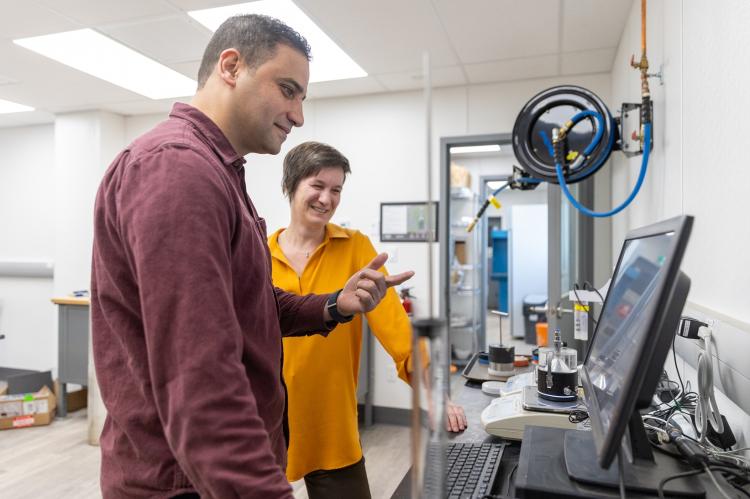Dr. Mohamed Naouri, a postdoctoral research fellow at Lethbridge Polytechnic, will soon begin a new role at the Massachusetts Institute of Technology (MIT) as a senior research associate.

Dr. Mohamed Naouri and Dr. Willemijn Appels
He will work with the Global Engineering and Research (GEAR) Center at MIT on developing a low-cost, solar-powered desalination and drip irrigation systems to benefit small farming operations and conserve fresh water globally.
During his three years at Lethbridge Polytechnic, Naouri made significant contributions to the Centre for Applied Research, Innovation and Entrepreneurship (CARIE). Under the guidance of Dr. Willemijn Appels and the Mueller Irrigation Research Group, his research focused on using remote sensing to map soil moisture for variable-rate irrigation. This work is crucial for improving water use efficiency in agriculture, a key issue for both local and global food security.
"It was a really good environment to work in, with an openness for new ideas in a place that was expanding and developing in a really fast, but steady manner," says Naouri. He also appreciated the broad range of opportunities he was offered, including participation in industry and scientific events and funding discussions. These experiences not only advanced his research but also his professional development.
Appels, Senior Research Chair for the Mueller Irrigation Research Group, praised Naouri's adaptability and innovative approach. "The thing with applied research is that sometimes things are thrown at you that you weren't planning for, and you've got to be nimble and flexible and able to pivot," she says. His work at Lethbridge Polytechnic has laid a strong foundation for his future endeavours.
At MIT, Naouri will work on creating a prototype irrigation system to be tested in Egypt within the next two to three years. The system aims to address the lack of electrical grid power for water pumping and make it economically viable for small- and medium-scale farmers.
"With this opportunity at MIT, I look at it as reverse engineering of what I saw before, where the focus is usually on large-scale farms and not the small-scale ones. I think there are a lot of problems for small-scale farming that can be solved and can also be beneficial to improve what we have at a larger scale," says Naouri, who worked previously in the public and private sector.
While he will be missed at the polytechnic, Appels says connections in the scientific community may offer future opportunities. "It might be that we write another paper together, even after he's gone, or that we reach out and say, we have this data set, would you or one of your students be able to interpret that,' and vice versa," she says.
Naouri's journey from Lethbridge Polytechnic to MIT highlights the quality of research and opportunities available at the polytechnic and serves as an inspiration to the academic community.
CARIE has a total of five research themes, including Agriculture, Food and Environment, Business and Technology, Health and Wellness, Justice and Public Safety, and Science, Social Sciences and Humanities. CARIE is a catalyst for applied research that results in real-world solutions, economic growth, sustainability and social and community development.










